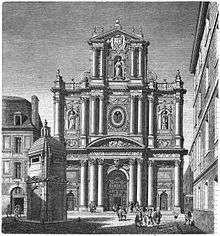Jean-François Foucquet

Jean-François Foucquet, also Jean-François Fouquet (12 March 1665 – 14 March 1741), was a Burgundy French Jesuit, bishop and scientist who was active in the Jesuit China missions for 22 years.[1]
Life
Fouquet was born in Vézelay in a wealthy family. He studied at Lycée Louis le Grand in Paris. In 1681 he entered the order of the Jesuits. Four years later he taught mathematics. In 1693 he became a priest and in the following year he decided he wanted to volunteer in Asia. In 1699 he arrived in Amoy. Until 1711 he worked in Fujian and Jiangxi, then he was invited to Peking, to teach math and astronomy.[2] He left hurriedly in 1720 with 1200 manuscripts. In Canton he had to wait one year for a French ship.[3] He returned to Europe in 1722.[4]
Fouquet had taken with him a Chinese man, named Hu, who liked Paris and got lost in Quartier Latin. Hu preached for a while in the Chinese language in front of Saint-Paul-Saint-Louis, attracting a crowd. Fouquet decided to go to Rome and planned to take Hu with him; Hu did not like to travel by stagecoach, got furious and preferred to go by foot. When Fouquet set off by himself, Hu was taken with a lettre de cachet to an asylum in Charenton, etc.[5]
On 8 June 1723, Fouquet was received by Pope Innocent XIII. Fouquet met another Chinese in Rome, who offered him help with translating. In 1725 he was appointed as bishop of Eleutheropolis in Palestine.
He published the Tabula Chronologica Historiæ Sinicæ ("Chronological table of Chinese History"). Foucquet, a Figurist,[6] endeavoured to show that the Book of changes (I Ching) anticipated the coming of Jesus Christ.[7]
Works
- De la Doctrine et des Livres des Chinois
- Tabula Chronologica Historiæ Sinicæ Connexa cum Cyclo qui vulgo Kia-Tse dicitur
Notes
- ↑ Martzloff, p. 358
- ↑ http://www.bdcconline.net/en/stories/f/foucquet-jeanfrancois.php
- ↑ Jonathan Spence (1988) The Question of Hu, p. 25-27?
- ↑ Jonathan Spence (1988) The Question of Hu, p. ?
- ↑ In 1726, Hu was released and traveled back to China.
- ↑ Mungello, p.92
- ↑ Mungello, p. 80
References
- John W. Witek S.J., Controversial ideas in China and in Europe: a biography of Jean-François Foucquet, S.J., (1665-1741), Institutum Historicum S.I., Roma, 1982
- David E. Mungello The Great Encounter of China and the West, 1500-1800: 1500-1800 Rowman & Littlefield, 2005, ISBN 0-7425-3815-X, ISBN 978-0-7425-3815-3
- Jean-Claude Martzloff, Jaques (FRW) Gernet, Jean (FRW) Dhombres A History of Chinese Mathematics, Springer, 2006 ISBN 3-540-33782-2, ISBN 978-3-540-33782-9